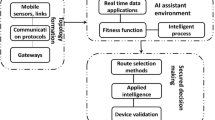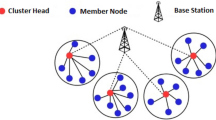Abstract
Wireless sensor networks (WSNs) have embraced mobile sink-based data collection for a decade due to its advantages in addressing sinkhole or energy hole problems, as well as collecting data from disjoint nodes. Several algorithms are introduced in the literature to address mobile sink-based algorithms for WSNs. However, they do not focus on the obstacles contained in WSNs. In this context, we propose RRTMT which performs efficient RP selection and obstacle-aware path planning for a mobile sink in WSNs with obstacles. A spectral clustering algorithm is used to identify the most effective RPs in which the hop count between the RPs and their children is minimal. Next, we determine the obstacle-aware path between the RPs using a rapidly-explored random tree (RRT) to adapt to the environment dynamically. We conduct the simulation through Python under different scenarios and various metrics. The proposed RRTMT outperforms the existing but related obstacle-sensitive mobile sink data collection algorithms by approximately 14-26% on network lifespan, 12-24% in energy efficiency, 6-19% in buffer utility, 17-51% on latency, 11-29% in packet delivery ratio, and 11-26\(\times\) in terms of average path length. We also estimate the complexity of the proposed work, and it is reasonable to compare it to the existing one.















Similar content being viewed by others

Data availibility
All data generated or analysed during this study are generated randomly during the simulation. The details about data generation is included in this published article.
References
Anwit R, Jana PK, Obaidat MS (2023) Obstacle adaptive smooth path planning for mobile data collector in the internet of things. IEEE Transactions on Sustainable Computing. https://doi.org/10.1109/TSUSC.2023.3281886
Banoth SPR, Donta PK, Amgoth T (2023) Target-aware distributed coverage and connectivity algorithm for wireless sensor networks. Wireless Netw 29:1815–1830. https://doi.org/10.1007/s11276-022-03224-1
Chang CY, Chen SY, Chang IH, Yu GJ, Roy DS (2020) Multirate data collection using mobile sink in wireless sensor networks. IEEE Sensors Journal 20(14):8173–8185
Sah DK, Donta PK, Amgoth T (2021) EDGF: empirical dataset generation framework for wireless network networks. Comput Commun. 180:48–56
Donta PK, Rao BSP, Amgoth T, Annavarapu CSR, Swain S (2019) Data collection and path determination strategies for mobile sink in 3D WSNs. IEEE Sens J 20(4):2224–2233
Donta PK, Amgoth T, Annavarapu CSR (2020) Congestion-aware data acquisition with q-learning for wireless sensor networks. In: 2020 IEEE International IOT, Electronics and Mechatronics Conference (IEMTRONICS). IEEE. p 1–6
Donta PK, Amgoth T, Annavarapu CSR (2021) An extended ACO-based mobile sink path determination in wireless sensor networks. J Ambient Intell Hum Comput 12:8991–9006
Donta PK, Srirama SN, Amgoth T, Annavarapu CSR (2022) Survey on recent advances in iot application layer protocols and machine learning scope for research directions. Digital Commun Netw 8(5):727–744
Donta PK, Srirama SN, Amgoth T, Annavarapu CSR (2023) icocoa: intelligent congestion control algorithm for coap using deep reinforcement learning. J Ambient Intell Hum Comput. https://doi.org/10.1007/s12652-023-04534-8
Farzinvash L, Najjar-Ghabel S, Javadzadeh T (2019) A distributed and energy-efficient approach for collecting emergency data in wireless sensor networks with mobile sinks. AEU Int J Electron Commun 108:79–86
Fu X, He X (2020) Energy-balanced data collection with path-constrained mobile sink in wireless sensor networks. AEU Int J Electron Commun 127:153504
Gowda CS, Jayasree P (2021) Rendezvous points based energy-aware routing using hybrid neural network for mobile sink in wireless sensor networks. Wirel Netw 27(4):2961–2976
Gupta GP, Saha B (2022) Load balanced clustering scheme using hybrid metaheuristic technique for mobile sink based wireless sensor networks. J Ambient Intell Human Comput 13:5283–5294. https://doi.org/10.1007/s12652-020-01909-z
Gutam BG, Donta PK, Annavarapu CSR, Hu YC (2021) Optimal rendezvous points selection and mobile sink trajectory construction for data collection in WSNs. J Ambient Intell Hum Comput. p 1–12
Jain S, Pattanaik K, Verma RK, Bharti S, Shukla A (2020) Delay-aware green routing for mobile-sink-based wireless sensor networks. IEEE Internet Things J 8(6):4882–4892
Jain S, Pattanaik K, Verma RK, Shukla A (2021) EDVWDD: Event-driven virtual wheel-based data dissemination for mobile sink-enabled wireless sensor networks. J Supercomput. p 1–26
Krishna K, Murty MN (1999) Genetic K-means algorithm. IEEE Trans. Syst, Man, Cybernetics, Part B (Cybernetics) 29(3):433–439
Kumar P, Amgoth T, Annavarapu CSR (2018) ACO-based mobile sink path determination for wireless sensor networks under non-uniform data constraints. Appl Soft Comput 69:528–540
Lin Z, Keh HC, Wu R, Roy DS (2020) Joint data collection and fusion using mobile sink in heterogeneous wireless sensor networks. IEEE Sens J 21(2):2364–2376
Mehto A, Tapaswi S, Pattanaik K (2020) PSO-based rendezvous point selection for delay efficient trajectory formation for mobile sink in wireless sensor networks. In: 2020 International Conference on COMmunication Systems & NETworkS (COMSNETS). IEEE. pp 252–258
Cb Moon, Chung W (2014) Kinodynamic planner dual-tree rrt (dt-rrt) for two-wheeled mobile robots using the rapidly exploring random tree. IEEE Trans Indus Electron 62(2):1080–1090
Naghibi M, Barati H (2020) EGRPM: energy efficient geographic routing protocol based on mobile sink in wireless sensor networks. Sustain Comput Inform Syst 25:100377
Najjar-Ghabel S, Farzinvash L, Razavi SN (2020) Mobile sink-based data gathering in wireless sensor networks with obstacles using artificial intelligence algorithms. Ad Hoc Netw 106:102243
Nasir J, Islam F, Malik U, Ayaz Y, Hasan O, Khan M, Muhammad MS (2013) RRT*-SMART: a rapid convergence implementation of RRT. Int J Adv Robotic Syst 10(7):299
Pasha MJ, Pingili M, Sreenivasulu K, Bhavsingh M, Saheb SI, Saleh A (2022) Bug2 algorithm-based data fusion using mobile element for iot-enabled wireless sensor networks. Measurement: Sensors. 24:100548
Praveen Kumar D, Tarachand A, Rao ACS (2019) Machine learning algorithms for wireless sensor networks: a survey. Inf Fusion 49:1–25
Sha C, Song D, Yang R, Gao H, Huang H (2019) A type of energy-balanced tree based data collection strategy for sensor network with mobile sink. IEEE Access 7:85226–85240
Sulakshana G, Kamatam GR (2022) Data acquisition through mobile sink for wsns with obstacles using support vector machine. J Sens 2022:1–20
Sulakshana G, Kamatam GR (2023) Data accumulation in wsns using a mobile sink: A linear programming approach. Measurement: Sensors. 27:100743
Verma A, Kumar S, Gautam PR, Rashid T, Kumar A (2020) Fuzzy logic based effective clustering of homogeneous wireless sensor networks for mobile sink. IEEE Sens J 20(10):5615–5623
Von Luxburg U (2007) A tutorial on spectral clustering. Stat Comput 17(4):395–416
Wen W, Shang C, Chang CY, Roy DS (2020) DEDC: joint density-aware and energy-limited path construction for data collection using mobile sink in wsns. IEEE Access 8:78942–78955
Yan D, Huang L, Jordan MI (2009) Fast approximate spectral clustering. In: Proceedings of the 15th ACM SIGKDD international conference on Knowledge discovery and data mining, p 907–916
Zhang H, Li Z (2020) Energy-aware data gathering mechanism for mobile sink in wireless sensor networks using particle swarm optimization. IEEE Access 8:177219–177227
Author information
Authors and Affiliations
Corresponding author
Ethics declarations
Conflict of interest
There is no conflicts of interest involved Financial/non-Financial or funding form any agency or among authors.
Research involving human participants and/or animals
No human or animal has harmed during any process directly or indirectly.
Informed consent
The corresponding author is acting on behalf of all the authors and would like to inform that there is no conflict of interest and consent among all.
Additional information
Publisher's Note
Springer Nature remains neutral with regard to jurisdictional claims in published maps and institutional affiliations.
Rights and permissions
Springer Nature or its licensor (e.g. a society or other partner) holds exclusive rights to this article under a publishing agreement with the author(s) or other rightsholder(s); author self-archiving of the accepted manuscript version of this article is solely governed by the terms of such publishing agreement and applicable law.
About this article
Cite this article
Boyineni, S., Kavitha, K. & Sreenivasulu, M. Rapidly-exploring random tree-based obstacle-aware mobile sink trajectory for data collection in wireless sensor networks. J Ambient Intell Human Comput 15, 607–621 (2024). https://doi.org/10.1007/s12652-023-04717-3
Received:
Accepted:
Published:
Issue Date:
DOI: https://doi.org/10.1007/s12652-023-04717-3



